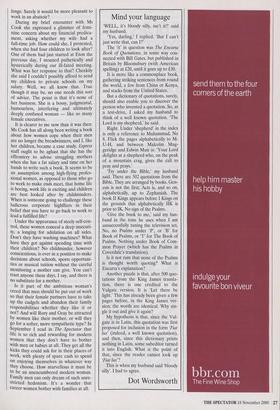Mind your language
'WELL, it's bloody silly, isn't it?' said my husband.
`Yes, darling,' I replied. 'But I can't just write that, can I?'
The 'it' in question was The Encarta Book of Quotations, in some way con- nected with Bill Gates, but published in Britain by Bloomsbury (with American spelling) at £20, until it goes up to £30.
It is more like a commonplace book, gathering striking sentences from round the world, a few from China or Kenya, and stacks from the United States.
But a dictionary of quotations, surely, should also enable you to discover the person who invented a quotation. So, as a test-drive, I asked my husband to think of a well known quotation. 'The Lord is my shepherd,' he said.
Right. Under 'shepherd' in the index is only a reference to Muhammad, No 8. Flick the pages alphabetically to M- U-H, and between Malcolm Mug- geridge and Edwin Muir is: 'Your Lord delights at a shepherd who, on the peak of a mountain crag, gives the call to pray and prays.'
`Try under the Bible,' my husband said. There are 502 quotations from the Bible. They are arranged by books. Gen- esis is not the first; Acts is, and so on, alphabetically, up to Zephaniah. The book II Kings appears before I Kings on the grounds that alphabetically IIK is prior to IK. No sign of the Psalms.
`Give the book to me,' said my hus- band in the tone he uses when I am unsuccessfully tuning the television set. No, no Psalms under `P', or 'B' for Book of Psalms, or 'T' for The Book of Psalms. Nothing under Book of Com- mon Prayer (which has the Psalms in Coverdale's translation).
Is it not rum that none of the Psalms is thought worth quoting? What is Encarta's explanation?
Another puzzle is that, after 500 quo- tations from the King James transla- tion, there is one credited to the Vulgate version. It is let there be light.' This has already been given a few pages before, in the King James ver- sion; the words are identical. Why sin- gle it out and give it again?
My hypothesis is that, since the Vul- gate is in Latin, this quotation was first proposed for inclusion in the form 'Fiat lux' (indeed, a well known quotation), and then, since this dictionary prints nothing in Latin, some subeditor turned it into English. What is the point of that, since the reader cannot look up `Fiat lux'?
This is when my husband said 'bloody silly'. I had to agree.
Dot Wordsworth


































































































 Previous page
Previous page